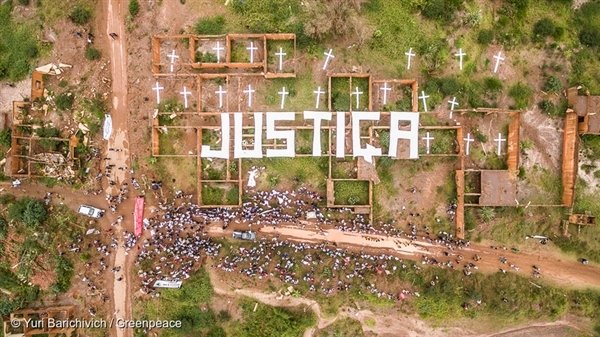One year later and no justice: Communities affected by dam disaster speak out

This past Saturday – 5 November, 2016 – hundreds of people gathered at the ruins of the Bento Rodrigues school in Mariana, Minas Gerais state, Brazil. They were there out of remembrance, and to call for justice.
Exactly one year before, two nearby dams holding mining waste collapsed, sending a wall of contaminated mud into the surrounding community. Without any warning, the Bento Rodrigues school, along with the homes and livelihoods of thousands, were utterly destroyed. Twenty-one people were killed.
That was only the beginning of this environmental catastrophe. 25,000 Olympic pools-worth of toxic mineral waste and mud released by the dams flowed into the nearest waterway – Brazil’s Rio Doce. Over the course of weeks, the contaminated material slowly worked its way to the Atlantic Ocean – choking out life along 700km of the river. Families, animals, houses, entire cities and the Doce River were devastated.
Still, the mining company in charge of the dam, Samarco (controlled by Vale and Anglo-Australian company BHP Billiton), has continued to act irresponsibly. One full year after the collapse of the dams, these companies have done little to repair the damages they caused.
That’s why people from the organization Movement of People Affected by Dams (Movimento dos Atingidos por Barragens or MAB), together with Greenpeace Brazil activists and representatives of social movements from twelve other countries, took a stand this weekend in Mariana. The millions of people affected by mining companies Samarco, Vale and BHP deserve justice, starting with rebuilding what was lost: places like the Bento Rodrigues school.
This tragedy also merits special scientific attention. So much of the impact of this mud – contaminated with arsenic, lead and chromium – is unknown. And the first step in the recovery of the Rio Doce Basin is to develop an in-depth understanding of this disaster’s socio-environmental impact.
In order to jump-start further investigation and ensure that there is space for independent scientific research, Greenpeace Brazil and #RiodeGente have published a call for proposals for independent studies in five different areas: fauna, flora, water, social impacts and human rights. Out of 60 projects submitted, six have been selected to receive around R$70,000 each in donated funds.
Hopefully, this new research will help recovery efforts in the Rio Doce Basin, and help hold Samarco, Vale and BHP accountable. The studies are expected to be completed by mid-2017.
For now though, it is up to all of us to make sure that the call for justice doesn’t just come from Mariana, but from people everywhere.
Help build pressure for Samarco, Vale and BHP to fulfill their responsibilities to the communities and ecosystems that they destroyed, and prevent tragedies like this one from happening again. Share this story.
Fabiana Alves is a water campaigner at Greenpeace Brazil.
Source: Green peace





 sending...
sending...